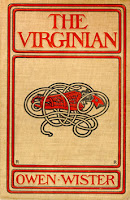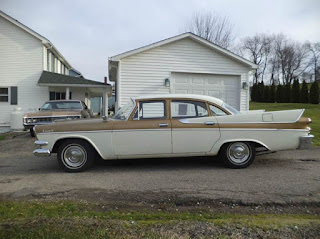Not Your Every Day Book Report
©2013 by LeeZard
I am not proud to admit that I have shied away from the classics over my many years of reading. I love to read but because I had the classics thrust upon me during my youthful rebellion against the New York City school system, I cheated myself.
 |
The Original Cover - 1902 |
Before we continue, a brief summary:
Loosely based on Wyoming’s famous Johnson County cattle war in the 1890s, the novel was originally entitled The Virginian: A Horseman of the Plains. It begins with an unnamed narrator's arrival in Medicine Bow, Wyoming, from back East and his encounter with an impressively tall and handsome stranger who proves adept at roping horses, teasing a friend who is off to be married, and facing down a fellow gambler, Trampas, with a pistol and a gently threatening, "When you call me that, smile!"
This stranger, known only as the Virginian, turns out to be the narrator's guide to Judge Henry's ranch in Sunk Creek, Wyoming. As the two travel the 263 miles to the ranch, the narrator, later nicknamed the "tenderfoot" and the Virginian begin to come to know one another as the Tenderfoot slowly begins to understand the nature of life in the West, which is very different from what he expected. This meeting is the beginning of what becomes a deep lifelong friendship and the starting point of the narrator's recounting of key episodes in the life of the Virginian.
From that point onward, the novel revolves around the Virginian and the life he lives. As well as describing the Virginian's conflict with his enemy, Trampas, and his romance with the pretty schoolteacher, Molly Stark Wood, Wister weaves a tale of action, violence, hate, revenge, love and friendship.
Dime Novel Cover - 1901
Wister is widely recognized as the godfather of the Western Novel. Before the 1902 publication of The Virginian, Western tales were told primarily via “dime novels” and magazine pieces.
Dime novels first appeared in the 1860s and for their 10¢ readers could escape into 100 or fewer fiction pages. Many of the original dime novels featured tales of the Wild West. The Virginian smashed all convention. My copy has more than 300 pages and I have cherished every one of them.
What follows are my observations/analysis and they are neither academic nor gospel.
The Virginian is so much more than a novel of the Old West. It is a study of morals and ethics, friendships between men, relationships between men and women and, as the narrator tells us, it explores the differences between quality and equality.
I don’t know how else to put it; Own Wister gently tells his story, and the stories within the story, in a manner that almost takes you into the book itself. The syntax in which he writes should seem archaic, for he was writing of his own time in his own language, but it is not - at least, not to me. He wrote with a rhythm that reached out to me. In fact, now I find myself using some of his words and terminology in my own speech and writing.
Tied up around a beautiful love story - from the man’s perspective no less - and filled with captivating vignettes and short stories that highlight Western life in the late 19th Century, The Virginian took me to reading places I’ve rarely been.
One of my favorite scenes encapsulates the Virginian's gentlemanly nature under his taciturn and sometimes violent exterior. He is explaining to Molly Stark Wood why he braced Trampas for being rude to her even before the Virginian formally met her. Upon hearing what Trampas said, the Virginian approached the evil man who was in the company of others and said, "Rise on your legs you polecat and tell them you're a liar." Then, explaining it to Molly, "Trampas thought I had no call to stop him sayin' what he pleased about a woman who was nothin' to me - then. But all women should be somethin' to a man."
If you’ve never read this marvelous book, run to your library or local bookstore and get it. Go online and buy it. Or, if you must read it NOW, here is a link to the best free online version I’ve found: The Virginian: Horseman of the Plains.
I hope you enjoy it - no, love it - as much as I did.
Dime novels first appeared in the 1860s and for their 10¢ readers could escape into 100 or fewer fiction pages. Many of the original dime novels featured tales of the Wild West. The Virginian smashed all convention. My copy has more than 300 pages and I have cherished every one of them.
What follows are my observations/analysis and they are neither academic nor gospel.
The Virginian is so much more than a novel of the Old West. It is a study of morals and ethics, friendships between men, relationships between men and women and, as the narrator tells us, it explores the differences between quality and equality.
I don’t know how else to put it; Own Wister gently tells his story, and the stories within the story, in a manner that almost takes you into the book itself. The syntax in which he writes should seem archaic, for he was writing of his own time in his own language, but it is not - at least, not to me. He wrote with a rhythm that reached out to me. In fact, now I find myself using some of his words and terminology in my own speech and writing.
Tied up around a beautiful love story - from the man’s perspective no less - and filled with captivating vignettes and short stories that highlight Western life in the late 19th Century, The Virginian took me to reading places I’ve rarely been.
One of my favorite scenes encapsulates the Virginian's gentlemanly nature under his taciturn and sometimes violent exterior. He is explaining to Molly Stark Wood why he braced Trampas for being rude to her even before the Virginian formally met her. Upon hearing what Trampas said, the Virginian approached the evil man who was in the company of others and said, "Rise on your legs you polecat and tell them you're a liar." Then, explaining it to Molly, "Trampas thought I had no call to stop him sayin' what he pleased about a woman who was nothin' to me - then. But all women should be somethin' to a man."
If you’ve never read this marvelous book, run to your library or local bookstore and get it. Go online and buy it. Or, if you must read it NOW, here is a link to the best free online version I’ve found: The Virginian: Horseman of the Plains.
I hope you enjoy it - no, love it - as much as I did.




Comments